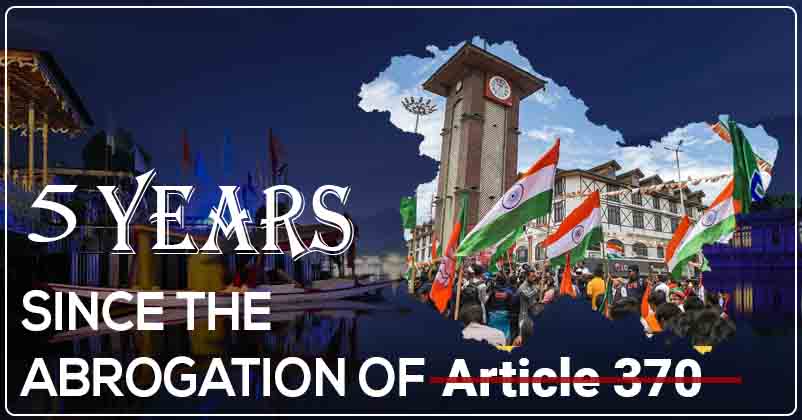By Written Sumit | Edited By: NTR
August 05, 2024, New Delhi. The abrogation of Article 370 in August 2019 marked a significant turning point in the socio-political and economic landscape of Jammu & Kashmir (J&K). This change has been accompanied by a range of transformative initiatives aimed at integrating the region more closely with the rest of India. One of the most significant advancements since the abrogation has been the swift progress in digitalization, marking a new era of governance and citizen empowerment. Comparing the state of digital initiatives before and after the abrogation reveals a dramatic transformation.
Before the abrogation of Article 370, Jammu & Kashmir faced significant challenges in digital connectivity and governance. Internet penetration was limited, and digital services were scarce, hindering effective governance and service delivery. Administrative processes were largely manual, leading to inefficiencies and a lack of transparency. Citizens often had to navigate bureaucratic hurdles to access government services, which were primarily offline.
Since 2019, J&K has made remarkable strides in e-governance and digital services, becoming a leader among Union Territories in India. The following highlights key areas of improvement:
In a relatively short period, J&K has emerged as a frontrunner in e-governance. According to official reports, J&K has achieved the distinction of being the first Indian UT to completely shift to e-governance mode. This milestone is a testament to the region’s commitment to embracing digital solutions to enhance governance and service delivery. This shift has streamlined administrative processes, increased transparency, and enhanced accountability, making government services more accessible and efficient for citizens, institutions, and businesses.
The adoption of the E-Office system has revolutionized administrative operations by digitizing government offices, leading to improved efficiency and transparency. Over 480 government offices have gone paperless, reflecting a substantial enhancement in administrative capabilities compared to the pre-abrogation era.
The Budget Estimation, Allocation, and Monitoring System (BEAMS) has transformed financial management in J&K by enabling real-time monitoring of budget utilization. This system ensures greater fiscal discipline and accountability in budget allocation and expenditure, a stark contrast to the opaque financial processes of the past.
The E-Unnat Portal, integrating 1,140 services from various departments, has revolutionized service delivery by making services easily accessible online. This platform has significantly improved the file disposal rate and streamlined processes such as the Rapid Assessment System and Employee Performance Portal.
Initiatives like Awam ki Awaaz and MyGov J&K have empowered citizens to engage actively with the government. These platforms foster two-way communication, allowing citizens to voice their concerns and participate in governance and decision-making processes, an opportunity that was limited before 2019.
The digitization of land records through Aapki Zameen Aapki Nigrani has brought unprecedented transparency and accountability to land transactions. The initiative’s integration with Aadhaar has enhanced credibility, making property transactions more transparent and accessible to citizens, unlike the cumbersome manual processes of the past. The transition to digital land records has resulted in a remarkable four-fold increase in property registrations over the past two years.
The digital revolution has also yielded substantial economic benefits. The elimination of the 150-year-old Darbar Move tradition, a result of the digitalization efforts, has saved approximately 400 crore rupees annually for the public exchequer. Additionally, the surge in online services from 60 to 1,140 has facilitated the processing of over 73 lakh applications, streamlining administrative processes and improving service delivery. The digital revolution in Jammu & Kashmir post-abrogation of Article 370 is a testament to the region’s commitment to leveraging modern technology for better governance. The host of digital initiatives, including E-Office, BEAMS, E-Unnat, and Aapki Zameen Aapki Nigrani, among others, have brought about transformative changes in the people’s lives. By enhancing transparency, accountability, and convenience, these initiatives have not only improved governance but also empowered citizens and boosted economic growth. As J&K continues to leverage digital solutions, it sets a remarkable example for other regions to follow, showcasing the potential of technology to drive positive change and development.



